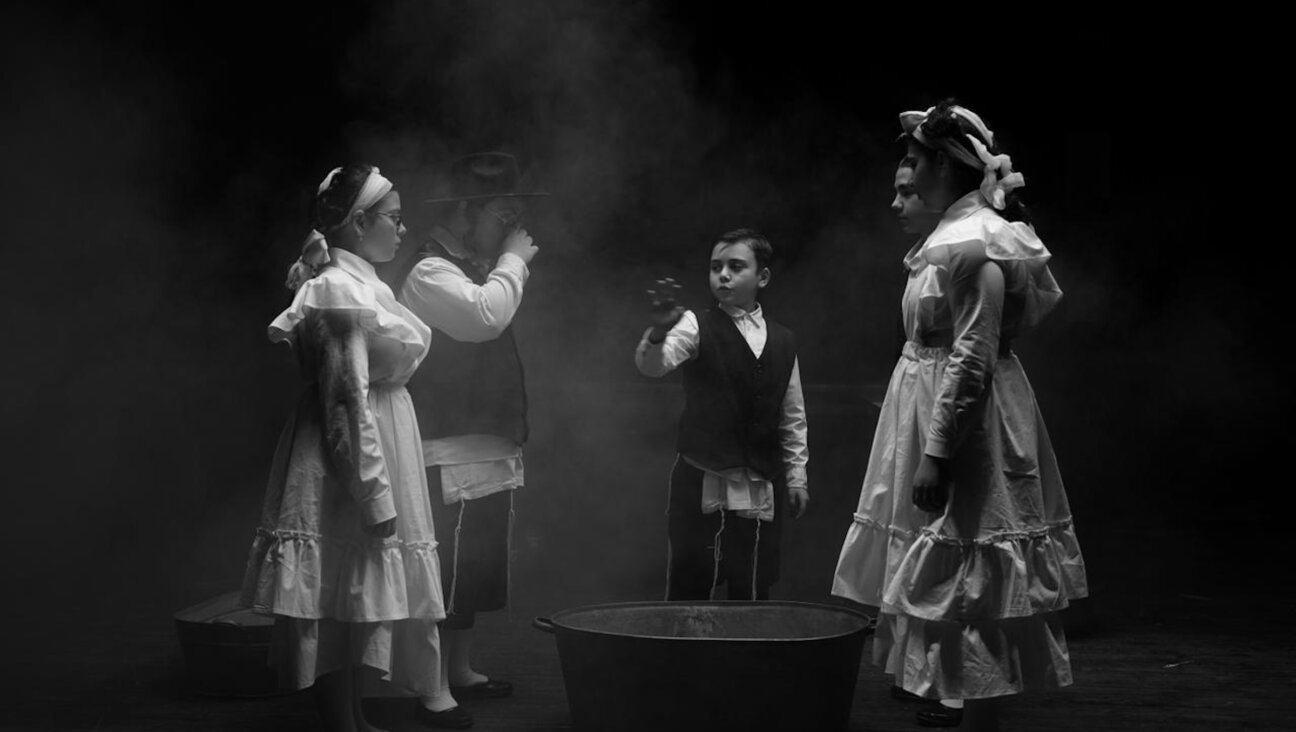Yiddish Chinese restaurant video is shared in China — with Mandarin subtitles
Students at Peking University translated the subtitles and shared the clip on China’s video platform, Bilibili, attracting 3,000 views after one day.

Graphic by Angelie Zaslavsky
A hilarious Yiddish video clip about Jewish diners in a Chinese restaurant on Christmas has now been released with Mandarin subtitles. As a result, the video is now accessible to a whole new audience. And since YouTube is blocked in China, the video was posted on China’s own video platform, Bilibili and other social media. After one day, the clip attracted over 3,000 views.
In 2015, Bilibili had over 50 million users — 75% of them under the age of 24.
The videotaped skit is an episode of the online comedy series YidLife Crisis. In the clip, titled “Yingl Belz,” the main characters Chaimie and Leizer (played by the show’s writers, Jamie Elman and Eli Batalion) are in a Chinese restaurant on Christmas. Munching on dumplings, they start arguing in Yiddish on the reason that Jews eat Chinese food on Christmas. The clip is accompanied by English subtitles.
As it turns out, a professor at Peking University in Beijing has been showing episodes of YidLife Crisis in her Yiddish course. Yang Meng launched the Yiddish class, called “Yiddish and Jewish Culture,” in September. She says it’s the first university Yiddish class to be taught in all of mainland China.
The Yiddish-Chinese connection is not a foreign one to us at the Forward. In 2010, we had a correspondent living in Kunming, China, who did a Yiddish video series on the question, what do people in China think of the Jews? Ross Perlin, a linguist and translator fluent in Yiddish and Mandarin, interviewed passers-by on the streets of the city; a local Chabad sheliakh (emissary) and a college professor of Jewish studies, and got some fascinating responses.
Yang is one of only a handful of Chinese academics fluent in the language. She learned Yiddish in New York City and wrote her dissertation on the Jewish exile in Shanghai during the Holocaust. This semester, 18 students are enrolled in her course. In addition to the language lessons, Yang also screens films on Jewish content after class. So far, the students have seen the first season of Shtisel and Woody Allen’s film Cafe Society.

Yang told the Forward that she believes YidLife Crisis has much to teach her students about Yiddish and Jewish culture. Sensing that an episode set in a Chinese restaurant in North America would resonate with them, she launched a class project: The students would translate the English subtitles into Mandarin and share it on Chinese social media.
Getting the task done wasn’t easy, though. Because there are so few Jews living in China (only 2,500 out of a population of 1.4 billion), Yang’s students had trouble understanding the cultural references and the humor in the clip. To help them along, she asked Elman and Batalion to answer her students’ questions over Zoom and email — not always easy, considering the time zone difference.
“We went over every joke, every line and every nuance in the episode,” Elman said.
The Chinese restaurant clip went live on Bilibili on Saturday. Yang is both excited and grateful for Elman’s and Batalion’s help in getting the project done. “Now we know the rule in kashrut about no milk and meat together and about the tradition of Jews going to a Chinese restaurant on Christmas,” she said.
“Yidlife Crisis has really enriched our class, making us think more about our cultural differences and similarities,” she said. “What they’re doing is a mitzvah.”

















